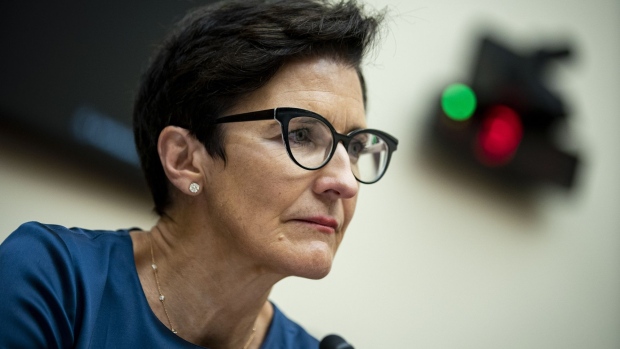Oct 14, 2022
As Citi’s Traders Struggle, Consumers Prop Up the Bank’s Profit
, Bloomberg News

(Bloomberg) -- Citigroup Inc.’s push to improve profitability in its trading business crimped revenue in the third quarter as the firm demanded more collateral from clients and examined margin and hedging positions.
The company has been seeking to improve the ratio of revenue to risk-weighted assets inside its trading business, a key measure of profitability for the unit. That push has hindered trading revenues, which declined 7% in the quarter, Chief Financial Officer Mark Mason said.
“Some of those RWA actions did in fact put pressure on the revenue line in terms of either revenue foregone or reduced levels of revenue,” Mason said Friday on a conference call. “The performance that we saw in markets more broadly, if not for the RWA optimization efforts, would probably be closer to flat as opposed to down 7% or so.”
The work is part of Chief Executive Officer Jane Fraser’s focus on improving returns across Citigroup. The firm, who’s profits have long trailed rivals, said Friday it still believes it can achieve a return on tangible common equity of as much as 12% over the medium term.
Citigroup has previously said clients that don’t meet internal profitability thresholds are being encouraged to trade more products with the bank. When that’s not possible, Citigroup has stopped trading with certain clients.
“We’ve been doing it across markets, in equities and fixed income, specifically in global spread products,” Mason said. Revenue from trading such products declined 39% in the period to $570 million.
The work comes as the Federal Reserve’s battle against inflation takes a toll on Citigroup’s broader Wall Street operations. Industry leaders have warned in recent weeks that corporate clients are getting worried about rate hikes and the potential for a recession, straining markets and stymieing dealmaking.
At Citigroup, fees from investment banking plummeted 64%, while revenue from stock trading slumped 25%. That more than countered a surprise increase in overall revenue from fixed-income trading, where rates and currencies desks did successfully navigate dramatic shifts in prices.
While Citigroup’s Wall Street operations wrestled with tough markets, the bank got a boost from the little guy: retail operations that saw spending, lending and demand for other financial products soar. In all, the New York-based firm’s earnings per share amounted to $1.63, surpassing the $1.42 average estimate from analysts. Revenue rose 6% to $18.5 billion, also beating the projections.
Citigroup’s shares traded up 1.5% to $43.58 at 1:10 p.m. in New York.
Inflation has left banks and other card issuers in a lucrative -- but potentially precarious -- spot this year. Prices have risen just fast enough that shoppers are spending more, but not so steep that people are forgoing luxuries and travel. That and higher interest rates are juicing earnings from lending.
It’s a contrast with the depths of the pandemic, when rising unemployment prompted Citigroup and rivals to curtail card marketing. The firm has since fired up those operations, financing more purchases just as prices climb at the register.
The branded-card unit, which includes the Double Cash and Custom Cash cards, saw revenue surge 10% in the quarter to $2.3 billion, topping analysts’ estimates. Spending on branded cards jumped 14%, while average loans jumped 12%. Revenue from wealth management declined, hurt by operations in Asia.
Citigroup has been seeking to exit more than a dozen overseas retail operations. Fraser on Friday announced the company will also wind down its institutional operations in Russia after it already announced a similar plan for consumer and commercial businesses there.
“We have been supporting our multinational clients in Russia,” Fraser said. “We are now informing them that we will be ending nearly all of the institutional banking services we offer by the end of the first quarter of next year. At that point, our only operations in Russia will be those necessary to fulfill our remaining legal and regulatory obligations.”
Higher levels of inflation and the ensuing economic concerns forced Citigroup to set aside more reserves for souring loans, sending the firm’s total cost of credit up to $1.4 billion in the quarter -- in line with analysts’ estimates. That compares with a benefit of $192 million a year earlier, when the bank released reserves it had taken during the pandemic.
(Updates with details on collateral requirements from first paragraph.)
©2022 Bloomberg L.P.


